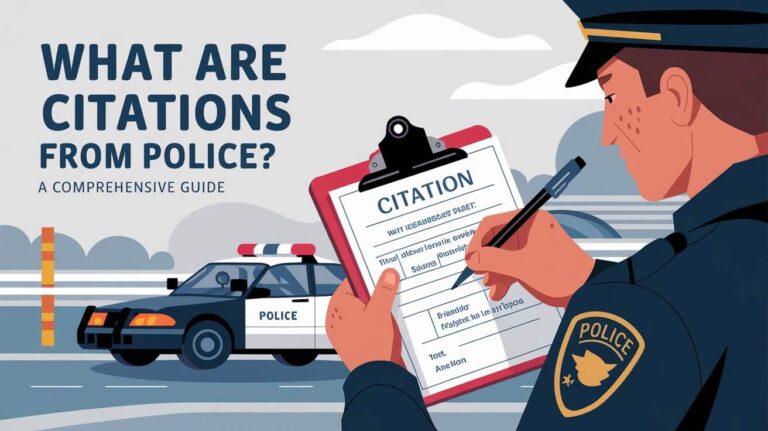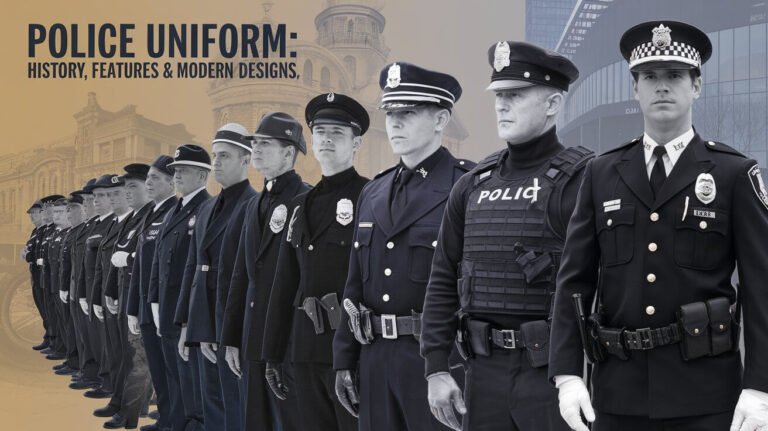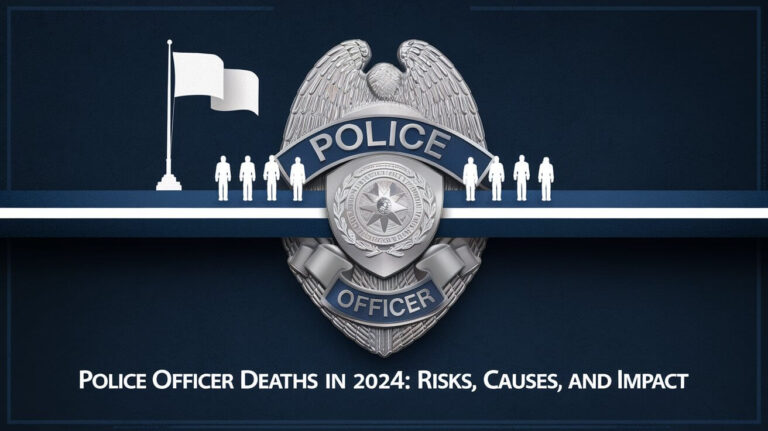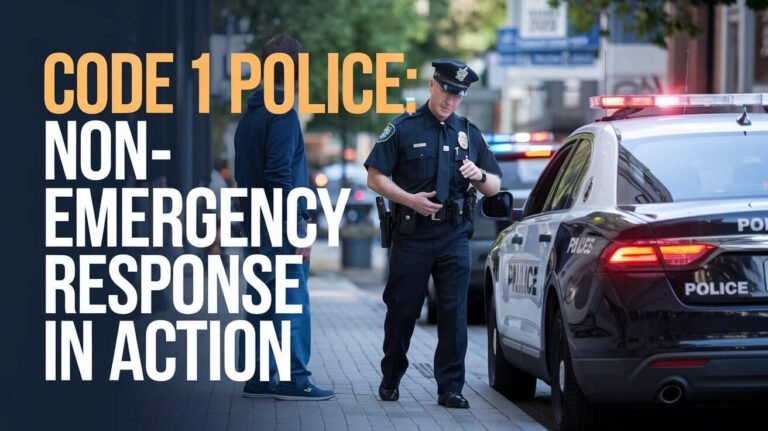Police Vs Fireman: Who Faces Greater Daily Challenges?
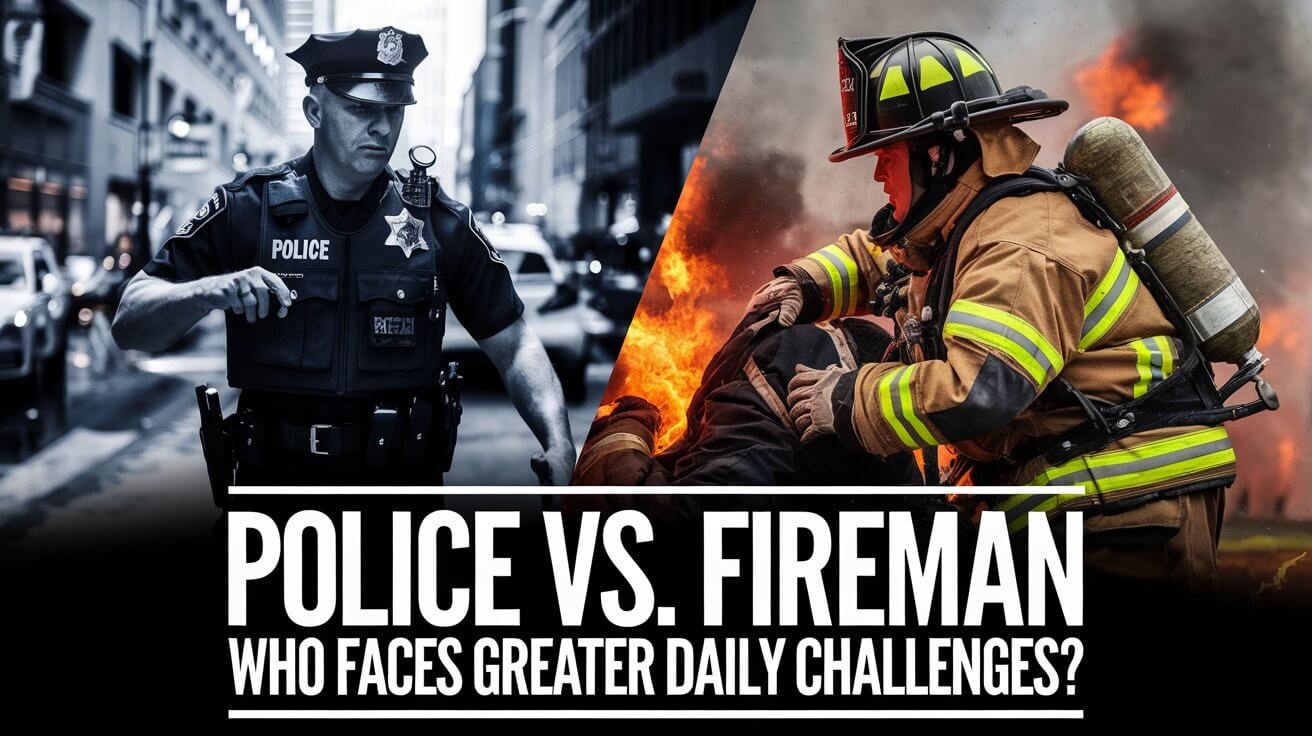
Police officers and firefighters are key figures in keeping our communities safe. They both play important roles in protecting us, but their jobs are different. Police officers enforce laws and keep the peace, while firefighters fight fires and save lives.
Police officers are the first line of defense against crime. They have about 800,000 members in the U.S. They protect us, solve crimes, and keep the public safe.
Firefighters, with around 300,000 members, are the ones who fight fires and save lives. They also handle emergencies like medical calls and spills. Their main job is to stop fires and help in disasters.
Key Takeaways
- Police officers and firefighters are both essential public safety professionals with distinct roles and responsibilities.
- Police officers focus on law enforcement, crime prevention, and maintaining public order, while firefighters specialize in fire suppression, rescue operations, and emergency response.
- Both careers require extensive training, bravery, and a commitment to serving the community.
- Job growth for both police officers and firefighters is projected to remain steady, with a 4% and 5% increase respectively by 2024.
- Salaries for these professions are comparable, with average ranges of $40,000 to $50,000 per year.
Public Safety Heroes: Police Vs Fireman
Police officers and firefighters are true heroes in our communities. They wear different uniforms but share a common goal: to keep us safe. Their bravery and dedication are unmatched.
Red vs. Blue: Color-Coded Service Distinctions
Police officers wear blue uniforms and focus on stopping crimes and keeping the peace. Firefighters, in their red gear, fight fires and help in emergencies.
Daily Challenges and Responsibilities
Police officers face dangers from criminals and guns every day. Firefighters risk their lives to fight fires and save people from danger.
Core Mission Differences
Police officers protect us by enforcing laws. Firefighters save lives and property by fighting fires and helping in emergencies.
| Profession | Primary Duties | Key Challenges |
|---|---|---|
| Police Officer | Crime prevention, law enforcement, maintaining public order | Confronting criminals and firearm-related dangers |
| Firefighter | Fire suppression, rescue operations, emergency medical services | Battling hazardous fires and navigating collapsing structures |
These heroes, in their unique uniforms, are the backbone of our safety. Their bravery and duty are a shining example for all of us.
Educational Requirements and Training Paths
People wanting to be police officers or firefighters start with a similar base – a high school diploma or its equivalent. Police officers might get a bachelor’s degree in criminal justice. Firefighters could take fire science courses or get EMT certification.
Police recruits go through tough training at police academies. They learn about laws, self-defense, and how to use guns. Firefighters get special training in fire science and emergency medical services. Both groups need to keep learning to stay up-to-date.
| Law Enforcement Training | Firefighter Education |
|---|---|
| High school diploma or equivalent Bachelor’s degree in criminal justice or related field Police academy training Ongoing certification and in-service training | High school diploma or equivalent Fire science courses or EMT certification Specialized firefighter training Continuous professional development |
Both law enforcement and firefighting need a lot of training and a dedication to serving the public. To succeed in these careers, you need to be physically fit, have a strong sense of duty, and make quick decisions when it matters most.
“The foundation of a successful career in public safety is built upon a solid educational and training foundation.”
Career Growth and Advancement Opportunities
If you’re interested in public safety, both police and firefighter jobs have great career advancement chances. Even though the paths and units differ, these leadership roles let you make a big difference in your community.
Rank Structure and Promotions
Police departments have a bigger rank structure than fire departments. Officers start as patrol officers and can move up to roles like detective, sergeant, and lieutenant. They can even reach higher positions like captain and chief. To advance, they need more training, experience, and to pass exams.
Specialized Units and Divisions
Both police and fire services have special units and divisions. Police officers can join SWAT, K9 units, bomb squads, or become detectives. Firefighters can specialize in hazardous materials, search and rescue, or fire inspections. Getting good at these areas helps a lot with career advancement.
Leadership Positions
Those who want to lead can become police or fire chiefs. These top jobs guide the department’s strategy and daily work. Both careers offer chances to take on leadership roles and leave a lasting mark on the community.
| Police Careers | Firefighter Careers |
|---|---|
| Extensive rank structure with opportunities for advancement | More limited rank structure but specialized roles available |
| Diverse specialized units like SWAT, detectives, K9 | Specializations in areas like hazmat, search and rescue |
| Administrative and executive leadership roles like Police Chief | Command-level positions such as Fire Chief |
Salary Structures and Financial Benefits
Public service pay varies between police and firefighters. Police officers make about $55,670 a year on average. Firefighters earn around $45,250, based on U.S. Bureau of Labor Statistics data. Location, job type, and agreements can change these numbers.
Both jobs offer great benefits like health insurance and retirement plans. Firefighters get a 24-hours-on, 48-hours-off schedule. This lets them work extra jobs. In places like Kentucky, they’ve even gotten back pay for overtime.
Salary growth can differ too. Firefighters might see bigger pay hikes in some areas. The respect and danger of each job play a big role in their pay. This helps keep skilled people in these important roles.
Common Questions
What are the key differences between police officers and firefighters?
Police officers work on preventing crimes and enforcing laws. Firefighters mainly fight fires and help in emergencies. Both jobs need bravery and commitment, but they have different tasks and risks.
How do the daily duties and challenges differ for police and firefighters?
Police officers face dangers from criminals and guns. Firefighters deal with dangerous fires and buildings that might fall. Police work on stopping crimes and keeping order. Firefighters focus on fighting fires and helping in emergencies.
What are the core missions of police and firefighters?
Police officers aim to protect people and property by enforcing laws. Firefighters work to save lives and property from fires and emergencies.
What are the educational requirements and training paths for police and firefighters?
Police officers might have a degree in criminal justice. Firefighters can take courses in fire science or get EMT certified. Both need special training. Police go to academies, and firefighters learn about fire science and medical services.
How do the career growth and advancement opportunities differ for police and firefighters?
Police have more career paths with different ranks and units. This lets them move up to detective, sergeant, and more. Firefighters have fewer ranks but can specialize in areas like hazardous materials. Both can become leaders, but police have more administrative roles.
How do the salaries and financial benefits compare between police and firefighters?
Police officers usually make more money than firefighters. The U.S. Bureau of Labor Statistics says police officers earn a median of $66,020 a year. Firefighters make about $50,700. Both get good benefits like health insurance and retirement plans. Firefighters might see bigger salary increases in some places.

